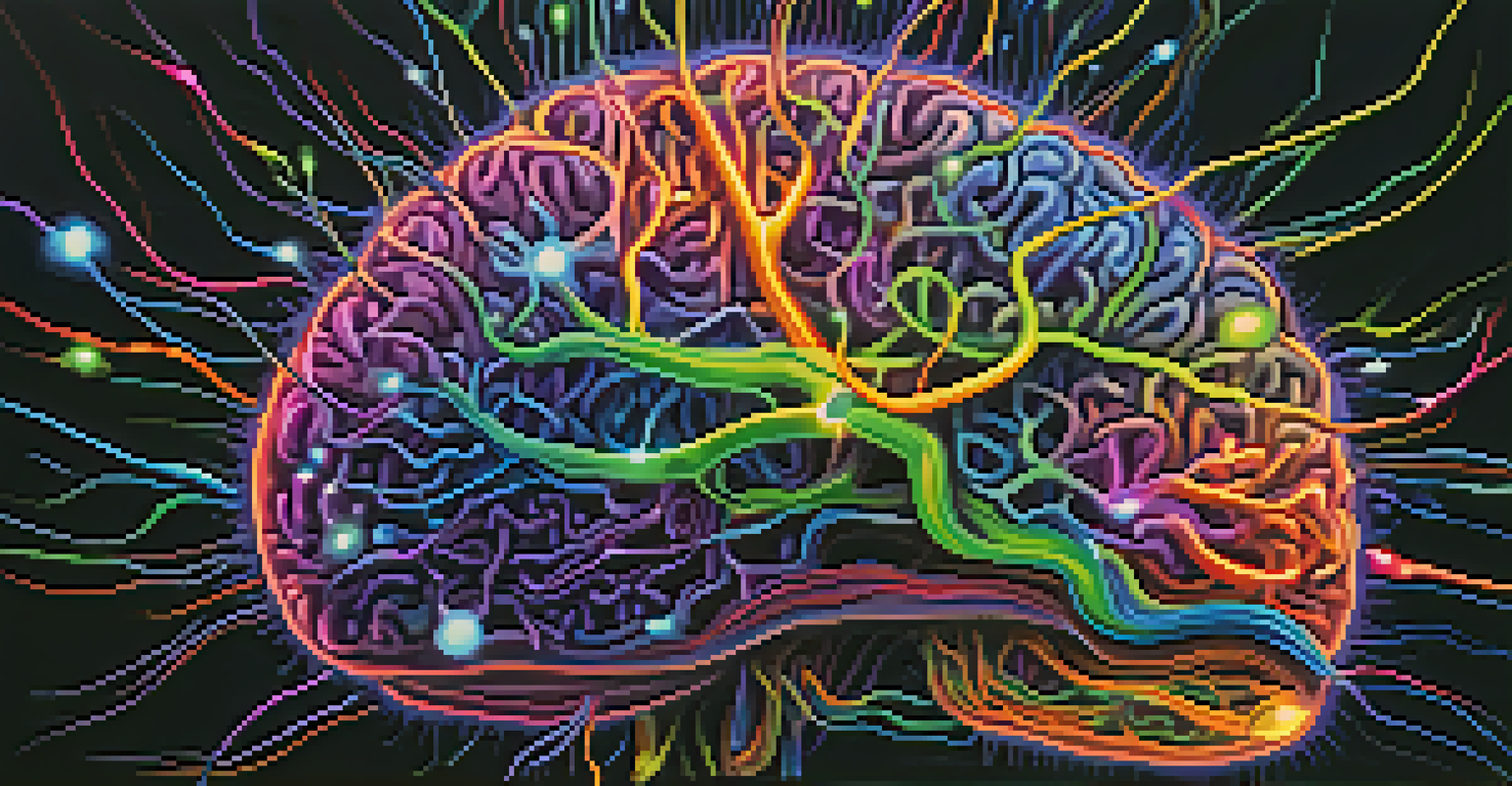Exploring the Therapeutic Potential of Hallucinogens Globally

Understanding Hallucinogens: A Brief Overview
Hallucinogens are substances that alter perception, mood, and various cognitive processes. Common examples include psilocybin, LSD, and mescaline, each with a rich history of use in various cultures. While often associated with recreational use, these substances are being revisited in research settings for their potential therapeutic benefits. Understanding their effects is key to unlocking their potential in mental health treatments.
The greatest discovery of my generation is that a human being can alter his life by altering his attitudes.
Historically, many indigenous cultures have utilized hallucinogens for spiritual and healing practices. For instance, the use of peyote in Native American rituals showcases a long-standing relationship between these substances and community healing. This cultural context helps frame the modern scientific inquiry into their therapeutic uses, as researchers seek to establish a bridge between ancient wisdom and contemporary medicine.
Recent studies indicate that hallucinogens may play a role in treating conditions such as PTSD, depression, and anxiety. By promoting neuroplasticity—the brain's ability to adapt and reorganize—these substances can help individuals process traumatic experiences and develop healthier coping mechanisms. As a result, the conversation around hallucinogens is shifting from stigma to potential treatment options.
The Science Behind Hallucinogens and Mental Health
Research suggests that hallucinogens can significantly impact mental health by altering brain connectivity. For instance, studies using fMRI scans have shown changes in brain activity that correlate with improved mood and reduced anxiety after hallucinogenic experiences. This scientific exploration is crucial for understanding how these substances can be safely and effectively integrated into therapeutic practices.

One major area of focus is the role of serotonin receptors in the brain. Hallucinogens often act on these receptors, leading to altered states of consciousness and emotional release. This mechanism may help explain why individuals report profound insights or emotional breakthroughs during their experiences, which can aid in therapeutic settings.
Hallucinogens Aid Mental Health
Research indicates that hallucinogens like psilocybin and MDMA show promise in treating conditions such as PTSD, depression, and anxiety.
Moreover, the therapeutic context in which hallucinogens are administered plays a vital role in their efficacy. Controlled environments, guided sessions, and integration therapy afterward can enhance the benefits while minimizing potential risks. This structured approach is essential for ensuring the safety and well-being of individuals undergoing treatment.
Global Perspectives: Countries Embracing Hallucinogen Research
Different countries are approaching hallucinogen research with varying degrees of openness and regulation. In the United States, for example, organizations like MAPS (Multidisciplinary Association for Psychedelic Studies) are pioneering clinical trials on substances like MDMA for PTSD treatment. This progressive movement is gaining traction as more data emerges supporting the safety and efficacy of these treatments.
Psychedelics are a powerful tool for exploring the mind and understanding the complexities of mental health.
In Canada, recent policy changes are allowing for more flexible use of psilocybin in therapeutic settings, particularly for terminally ill patients seeking relief from existential distress. This shift reflects a growing recognition of the potential benefits of hallucinogens in modern medicine, paving the way for expanded research opportunities.
Conversely, some countries remain cautious, citing concerns over potential abuse and lack of comprehensive research. However, as global awareness and interest in the therapeutic potentials of hallucinogens continue to grow, these conversations are crucial for shaping future policies and research agendas.
Therapeutic Use Cases: Success Stories
Several therapeutic use cases illustrate the potential of hallucinogens in treating mental health conditions. For example, a small-scale study on psilocybin demonstrated remarkable results for patients with treatment-resistant depression, with many participants reporting significant improvements in mood and overall well-being. These success stories highlight the importance of continued research and exploration into hallucinogenic therapies.
Another compelling case involves the use of MDMA in couples therapy. Studies have shown that the substance can enhance emotional openness and communication between partners, fostering deeper connections and facilitating healing. This has led to renewed interest in using hallucinogens not just for individual therapy, but also for relationship counseling.
Integration Therapy Enhances Benefits
Integration therapy post-hallucinogenic experience helps individuals process insights and apply them to everyday life, improving overall therapeutic outcomes.
These narratives not only provide hope for those struggling with mental health issues but also serve as powerful testimonies for the therapeutic potential of hallucinogens. They challenge existing paradigms and inspire further exploration into how these substances can be utilized in safe, effective ways.
Challenges and Controversies in Hallucinogen Research
Despite the promising potential of hallucinogens, several challenges and controversies surround their research and use. One major concern is the stigma associated with these substances, often tied to their history of recreational use and potential for abuse. Overcoming this stigma is essential for advancing research and integrating these therapies into mainstream medicine.
Another challenge lies in regulatory hurdles, as many hallucinogens remain classified as Schedule I substances in various countries. This classification complicates research efforts and limits access for those who might benefit from these therapies. Advocating for policy reform will be crucial in facilitating more extensive studies and clinical applications.
Moreover, the safety and ethical considerations surrounding hallucinogen use cannot be overlooked. Ensuring that individuals are adequately screened and supported during their experiences is vital for minimizing risks. As the field evolves, establishing clear guidelines and protocols will be essential for responsible use in therapeutic settings.
The Role of Integration Therapy Post-Experience
Integration therapy is a crucial component of the therapeutic process involving hallucinogens. After experiencing a hallucinogenic session, individuals often need support to process their experiences and insights. This type of therapy helps them make sense of what they encountered and apply it to their everyday lives, enhancing the overall therapeutic benefits.
In integration sessions, therapists work with clients to explore the emotions and thoughts that arose during their hallucinogenic experience. This dialogue fosters a deeper understanding of personal challenges and can lead to lasting changes in behavior and mindset. By providing a safe space for reflection, integration therapy solidifies the healing process.
Global Shift in Hallucinogen Research
Countries are increasingly embracing hallucinogen research, paving the way for clinical trials and innovative treatment protocols to address mental health challenges.
Ultimately, the combination of hallucinogens and integration therapy can create a powerful framework for personal growth and mental health improvement. As researchers and practitioners continue to explore this synergy, it may lead to more effective treatment models that prioritize holistic well-being.
Looking Ahead: Future of Hallucinogen Research
The future of hallucinogen research appears promising, with increasing interest from both the scientific community and the general public. Ongoing studies are expected to uncover more about the mechanisms behind these substances and their potential applications in various mental health conditions. This growing body of research could lead to a paradigm shift in how we approach mental health treatment.
As more countries begin to relax restrictions on hallucinogen research, we can anticipate a wave of clinical trials and innovative treatment protocols. This expansion will likely foster collaboration between researchers, therapists, and policymakers, creating a comprehensive approach to understanding and utilizing hallucinogens for therapeutic purposes.

While challenges remain, the momentum behind hallucinogen research is undeniable. By continuing to prioritize evidence-based practices and advocating for responsible use, the medical community can harness the therapeutic potential of these substances to improve mental health outcomes globally.